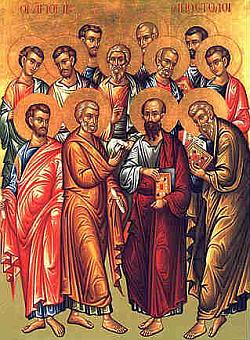 It was turning out to be the worst meeting Matthias had attended.
It was turning out to be the worst meeting Matthias had attended.
Yes, the worship had been exemplary, as usual. No doubt the Lord was present in their midst. But then, so it seemed was a spirit of bureaucracy—and Matthias hated bureaucracy. Hadn’t he been chosen by a casting of lots? How much easier could it have been?
And why DID the Gentiles have to receive the Gospel? Why couldn’t it have stayed among the Jews only? What a bureaucratic nightmare.
So there he sat, hoping against hope that Peter was not going to chime in again.
Oh, heavens no. Here we go.
Peter stood up.
“Brothers,” the apostle announced in his bass voice that shook the flimsy meeting room furniture, “having weighed this question in my soul after much placement before the Lord, I conclude that there are actually only seven steps to a God-honoring sex life.”
“We weren’t talking about sex, Peter,” Silas said. “Were you asleep—again?”
“The question was the title of Levi’s preaching series,” Barnabas reminded, “The 10 Principles of Financial Success.”
He had a gift for reading lips, and Matthias swore that James mouthed, It’s a baker’s dozen, not 10. That James’s little brother then punched him in the arm meant the youngest attendee at the meeting had heard him too.
A man with a pained expression on his face stood and asked, “How are the Gentiles going to live a life of fullness in our Lord if we who are appointed their leaders can’t decide these simple issues?”
Matthias shook his head. Thomas again. Always stirring the pot.
“Everything depends on our hammering down what is necessary for the Gentiles to live,” Peter agreed.
“You remember that our Lord said I was an Israelite without deceit—” Nathanael started.
Matthias rolled his eyes. Always the same prelude from Nathanael.
“—and I think that we never settled on the take-away points of my series, Raising Godly Children in an Ungodly World.”
“Hey, Mr. Honesty,” someone yelled from across the dimly lit room, “why not be truthful with the Gentiles and tell them you don’t have any children?”
Matthias thought that was worth a good chuckle. He wasn’t alone.
“Now listen here—” Nathanael began, before he was cut off again.
“Five Biblical Ways to Reach Your Neighbors for Christ,” Philip said. “I mean, c’mon, guys. Isn’t that what we’re all about? I used those five when I spoke to that eunuch, and you all know how effective that was. Shouldn’t the Gentiles know them? Just five simple ways?”
Andrew leaned over to Matthias and said, “I tuned out after they kicked out Martha. I kind of liked her Beat Busyness the Bible Way.” He then turned pensive and asked, “Do you remember how many steps her method had?”
“I think it was five,” Matthias answered.
Andrew glowered. “No, I think you’re thinking about Philip’s five ways.”
“Maybe I am,” Matthias said. “Maybe I am.”
***
That meeting in Jerusalem among the leaders of the young Church actually happened. It just didn’t happen that way. The question of how to live a godly life wasn’t found in principles or spiritual To-Do lists. Here’s that meeting’s conclusion:
After they finished speaking, James replied, “Brothers, listen to me. Simeon has related how God first visited the Gentiles, to take from them a people for his name. And with this the words of the prophets agree, just as it is written, “‘After this I will return, and I will rebuild the tent of David that has fallen; I will rebuild its ruins, and I will restore it, that the remnant of mankind may seek the Lord, and all the Gentiles who are called by my name, says the Lord, who makes these things known from of old.’ Therefore my judgment is that we should not trouble those of the Gentiles who turn to God, but should write to them to abstain from the things polluted by idols, and from sexual immorality, and from what has been strangled, and from blood.”
—Acts 15:13-21 ESV
In short, don’t load up the Gentiles with stuff to do. Stuff wasn’t the point of the Gospel.
Here’s how Paul saw living the Christian life:
For I decided to know nothing among you except Jesus Christ and him crucified.
—1 Corinthians 2:2 ESV
Jesus summed it up nicely:
And this is eternal life, that they know you the only true God, and Jesus Christ whom you have sent.
—John 17:3 ESV
How is it then that we sit still on Sunday and have someone tell us all these things we should be doing so as to be good Christians? How is it that we say we embrace grace, yet we load ourselves up with lists of necessities and principles and ways and means of living like Christians, when it all begins and ends with knowing Christ?
What if we just knew Christ and knew Him a little more each day? Can’t anyone tell us how to know Christ more?
Or do we not believe this Scripture?
And I am sure of this, that he who began a good work in you will bring it to completion at the day of Jesus Christ.
—Philippians 1:6 ESV
If we know Christ more deeply, isn’t it the work of the Father to make us perfect in His Son? Why then do we trouble ourselves with endless self-help sermons?
Now if the ministry of death, carved in letters on stone, came with such glory that the Israelites could not gaze at Moses’ face because of its glory, which was being brought to an end, will not the ministry of the Spirit have even more glory? For if there was glory in the ministry of condemnation, the ministry of righteousness must far exceed it in glory. Indeed, in this case, what once had glory has come to have no glory at all, because of the glory that surpasses it. For if what was being brought to an end came with glory, much more will what is permanent have glory. Since we have such a hope, we are very bold, not like Moses, who would put a veil over his face so that the Israelites might not gaze at the outcome of what was being brought to an end. But their minds were hardened. For to this day, when they read the old covenant, that same veil remains unlifted, because only through Christ is it taken away. Yes, to this day whenever Moses is read a veil lies over their hearts. But when one turns to the Lord, the veil is removed. Now the Lord is the Spirit, and where the Spirit of the Lord is, there is freedom. And we all, with unveiled face, beholding the glory of the Lord, are being transformed into the same image from one degree of glory to another. For this comes from the Lord who is the Spirit.
—2 Corinthians 3:7-18 ESV

 When we ask him to be everything, how can he not fail? When he’s forced to constantly preach and teach milk, how can he ever grow enough mature believers to fill the other roles in Ephesian 4, crucial roles designed to take the pressure off him?
When we ask him to be everything, how can he not fail? When he’s forced to constantly preach and teach milk, how can he ever grow enough mature believers to fill the other roles in Ephesian 4, crucial roles designed to take the pressure off him?